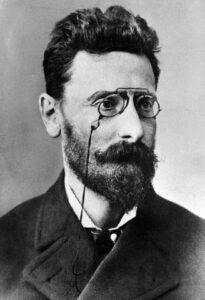
Joseph Pulitzer (April 10, 1847-Oct. 29, 1911) was born in Mako, Hungary, to merchant Fülöp Pulitzer and his wife Elize Berger. When Joseph was 6, the family moved to Pest, Hungary, where private tutors taught him French and German. When he was 11, his father died and the family subsequently became impoverished, prompting Joseph to emigrate at age 17 to the United States with his passage paid by military recruiters. He enlisted in New York and fought under General Philip Sheridan in the Appomattox campaign, completing his service on June 5, 1865. Until after the Civil War, he learned little English.
He traveled in a freight boxcar to St. Louis, where there was a large ethnic German population. He worked at a variety of entry level jobs, studied English at the St. Louis Mercantile Library, and eventually obtained a job as a reporter for the Westliche Post. His first bylined story concerned a scam in which promoters promised people jobs at a Louisiana sugar plantation, but after taking them about 30 miles downriver on a steamboat, the promoters forced the victims to disembark, and then sailed away.
At the age of 19, Pulitzer was naturalized as an American citizen. At 22, he was nominated by the Republican party to serve in the Missouri legislature, winning the seat by a popular vote of 209-147. He physically fought Captain Edward Augustine, Superintendent of Registration for St. Louis County, whom he had earlier accused of corruption. Augustine was shot non fatally in his stomach, and Pulitzer suffered a head wound. In addition to his legislative duties, Pulitzer stayed involved with the Westliche Post, eventually serving as its managing editor. In 1872, Pulitzer was appointed to the St. Louis Board of Police Commissioners.
Over the next four years, Pulitzer grew disillusioned with the Republican party, and favored the election of Democratic presidential candidate Samuel Tilden over the eventual Republican winner, Rutherford B. Hayes, in the 1876 presidential campaign. Two years later he purchased the St. Louis Post and Dispatch, which he combined into a single newspaper and renamed as the St. Louis Post-Dispatch.
Circulation which had been less than 4,000 increased to nearly 5,000 and doubled in size from four pages to eight. There was a steady increase in circulation each year thereafter, climbing to 22,300 by September 1883. When the Post-Dispatch’s managing editor John Cockerill killed Alonzo Slayback in a newsroom gun battle, Pulitzer’s reputation went into decline.
In 1878, he married Katherine “Kate” Davis, in an Episcopal ceremony in Washington D.C. After their marriage, he told her of his Jewish background. The couple would go on to have five children that survived to adulthood: Ralph, Joseph Jr., Constance Helen Elmslie, Edith Moore, and Herbert.
In 1883, looking for new opportunities, he purchased the New York World from railroad magnate Jay Gould. The newspaper more than doubled its circulation to 39,000 within three months of Pulitzer taking it over. Eventually, circulation increased to 600,000, making it the newspaper with the largest circulation in the country. The newspaper was filled with sensational headlines and human interest stories; its self-described style as “brief, breezy and briggity.” Investigative journalist Nellie Bly joined the staff in 1887, eventually to write a report on the horrible conditions in an insane asylum and her experiences taking a trip around the world in 72 days.
In 1884, Pulitzer was a strong backer of the presidential candidacy of Grover Cleveland, who went on to win New York State’s electoral college votes by a narrow margin. That same year Pulitzer was elected to Congress from New York City, but resigned a little more than halfway into his term, realizing he had more power as the publisher of the New York City newspaper. He also attacked Theodore Roosevelt as a young assemblyman, calling him a “reform fraud” and engendering a long and heated feud with the future President.
In 1895, The World launched a color comic strip called “The Yellow Kid” – a component in what later became known as the yellow journalism. That same year William Randolph Hearst purchased the New York Journal and began a circulation war. Both ran exited headlines leading up to the Spanish-American War in 1898.
At one point, Pulitzer was indicted for libel against Theodore Roosevelt and J.P. Morgan when The World reported that an illegal payment of $40 million had been made to the French Panama Canal Company. The indictment was dismissed.
Pulitzer was often the target of antisemites. Charles Dana, editor of the New York Sun, called him “Judas Pulitzer,” and Leander Richardson, who ran The Journalist called him “Jewseph Pulitzer.”
Health problems forced Pulitzer to take a less active role in the newspaper. In 1904, he hired Frank I Cobb to run the paper, and Cobb often battled with Pulitzer over who should be in charge of editorial policy.
Pulitzer once told Prof. Thomas Davidson that “every reporter is a hope and every editor is a disappointment.” He died while traveling by yacht to Georgia. He died while stopped in Charleston Harbor, South Carolina. In his will, Pulitzer left Columbia University $2 million to found the Graduate School of Journalism, which in 1917 organized the Pulitzer Prizes in journalism. He also prompted the founding of the School of Journalism at the University of Missouri.
Tomorrow: Ferdinand LaSalle
*
SDJW condensation of Wikipedia articles.